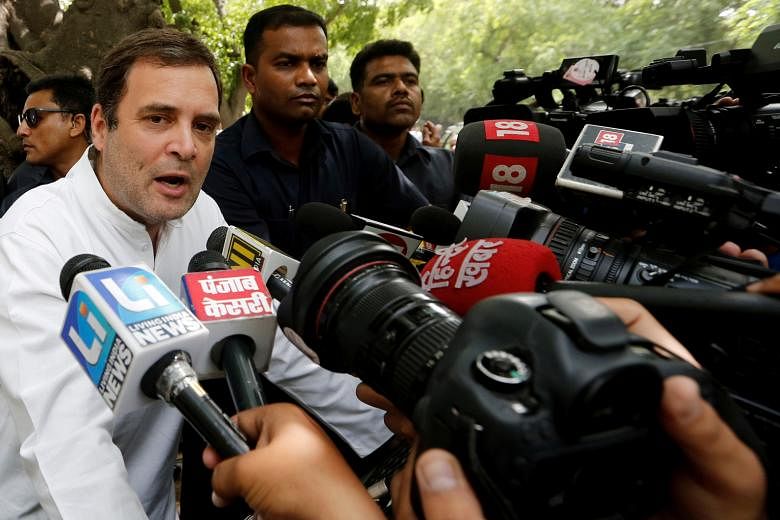India's grand old Congress party faces a leadership crisis as its president Rahul Gandhi refuses to reverse his decision to quit his post following a humiliating loss in last month's general elections.
Mr Gandhi, 49, the scion of the Nehru-Gandhi family that has given India three prime ministers, resigned a month ago after the Congress won just 52 of the 542 seats in the Lower House of Parliament.
But the party has refused to accept his resignation, with several protests breaking out including one by Youth Congress members on Wednesday. They urged Mr Gandhi - who had failed to retain even the family bastion of Amethi in the state of Uttar Pradesh - to take back his resignation.
Mr Gandhi, who reiterated his decision to resign on Wednesday, has steered clear of making any decisions in the party and urged the Congress to choose another leader.
Analysts say that continued uncertainty would further harm a party which, until the rise of the Bharatiya Janata Party (BJP) under Prime Minister Narendra Modi, was the dominant political force in Indian politics.
"I think it is leading to a lot of chaos, bad blood and weakening of the organisation (Congress). In India, politics is an everyday affair.
"There are fewer than 100 days left for the Haryana (state) elections. So the party needs leadership. There is no scope for dithering and uncertainty," said journalist and author Rasheed Kidwai.
"Rahul has to be very firm... he needs to step down and he must put down a time frame for succession."
The 134-year-old Congress party played a crucial role in India's independence from Britain. But it suffered back-to-back losses in general elections in 2014 and this year, and has seen its political influence wane as the BJP's political influence spread beyond its traditional support base in central and western India to other parts of the country, such as the north-east and east.
The BJP has also repeatedly contrasted Mr Gandhi, who was born to power, with Mr Modi's own humble beginnings as a tea seller to appeal to an aspirational India.
Analysts say the Congress is now facing its toughest challenge yet.
"This is one of the party's most serious crisis. We assumed he (Mr Gandhi) resigned and (the Congress) would take it but the crisis appears to be more serious," said Jain University's pro vice-chancellor Sandeep Shastri.
"If this is taken to a logical conclusion, it will be a paradigm shift that someone outside the dynasty will take the leadership. How seriously will they (Gandhi family) devolve power or will it be remote controlled? Only time can tell."
For most within the Congress, the Nehru-Gandhi family remains the glue that holds the party together.
Mr Gandhi entered politics in 2004, fighting his first election from Amethi.
His great-grandfather Jawaharlal Nehru was India's first prime minister after independence, his grandmother Indira Gandhi was the country's first woman prime minister and his father Rajiv Gandhi was India's youngest prime minister.
His mother Sonia Gandhi, as party president, led it to two successive polls wins - in 2004 and 2009.
Mr Gandhi, however, has faced constant questions over his leadership abilities. He became known as the reluctant prince of Indian politics because of his long absences from public life, often emerging only during election time. In the recent elections, he was seen to have worked hard but with little impact.
Mumbai Congress leader Sanjay Nirupam said: "Rahul Gandhi at this point... is the only leader who can lead the party. The recent (election) result is not a mandate against Rahul Gandhi.
"Modi and (former BJP president Amit) Shah worked in a different way and had a good campaign."
He noted that in the past month, not a single name had been offered as replacement for the party leader.
Mr Sanjay added: "There is a need to rethink, reorganise and revitalise the party, and a new narrative has to be drawn to take on BJP and Modi, who looks invincible.
"Nobody can do the work except Rahul Gandhi because the Gandhi family, no matter what, is an integral part of the party. Without the Gandhi family, the party can't survive. That is what we understand."

